Cocker Spaniels Dog
- February 1, 2024
- 0 comment
Cocker Spaniels, often simply referred to as “Cockers,” are a delightful breed of dog known for their friendly demeanor and charming appearance. These dogs have a rich history, originating in England as skilled hunting companions, particularly renowned for their ability to flush out woodcocks. Cocker Spaniels come in two primary varieties: the American Cocker Spaniel and the English Cocker Spaniel, each with its unique traits and characteristics. American Cockers tend to be smaller with luxurious coats, while English Cockers have a more athletic build and often work as hunting dogs.

Regardless of the variety, Cocker Spaniels are beloved for their affectionate and loyal nature, making them wonderful family pets. They thrive on human interaction and require proper grooming to maintain their beautiful coats. Caring for a Cocker Spaniel involves providing regular exercise, proper nutrition, and addressing their susceptibility to certain health issues like ear infections and eye conditions. With the right care and attention, Cocker Spaniels can bring joy and companionship to any home, earning their place as one of the most cherished dog breeds worldwide.
| Characteristic | Description |
|---|---|
| Origin | England |
| Size | Medium-sized |
| Varieties | American Cocker Spaniel, English Cocker Spaniel |
| Coat Type | Silky, medium-length |
| Coat Colors | Various colors and patterns |
| Temperament | Friendly, affectionate, loyal |
| Exercise Needs | 30-60 minutes daily |
| Grooming Requirements | Regular brushing and grooming |
| Health Concerns | Ear infections, eye problems, hip dysplasia |
| Lifespan | 10-14 years |
| Trainability | Intelligent and responsive to training |
| Family Compatibility | Excellent family pets |
| Watchdog Ability | May bark to alert, not aggressive |
The Loving Companions You Need
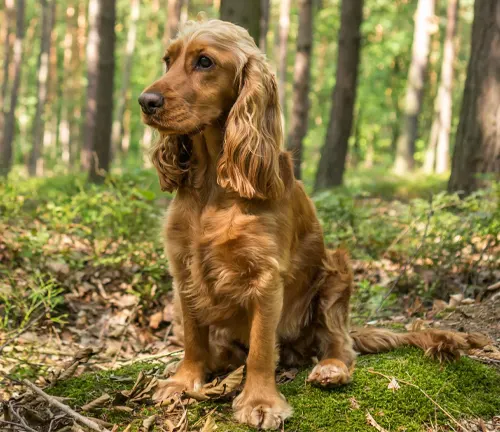
Cocker Spaniels have long been cherished as one of the most endearing and delightful dog breeds in the world. Their charming personalities, striking appearance, and unwavering loyalty make them a beloved choice for families and individuals alike. In this comprehensive article, we’ll explore the fascinating world of Cocker Spaniels, covering everything from their history and characteristics to their care, training, and the special bond they share with their human companions.
History of Cocker Spaniels
The history of Cocker Spaniel dogs is a fascinating journey that takes us back to their origins in England. These delightful dogs have a rich heritage deeply rooted in their role as skilled hunting companions. Here’s an overview of the history of Cocker Spaniels:
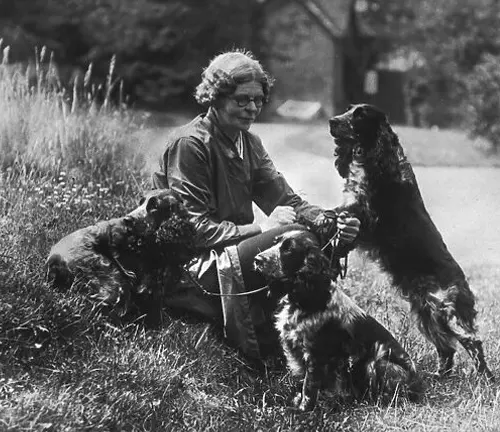
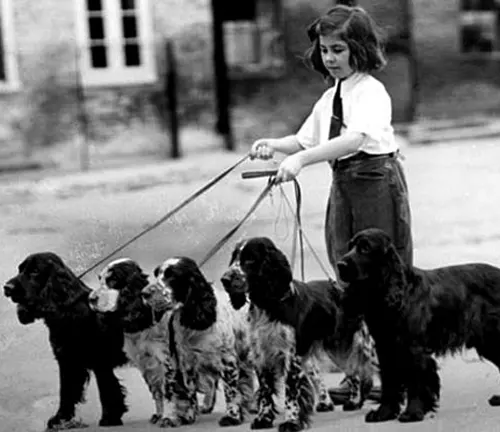
- Early Beginnings: Cocker Spaniels, as we know them today, originated in England during the 19th century. They were initially bred as a distinct breed to specialize in hunting woodcocks, a type of game bird known for its elusive nature and preference for dense underbrush habitats.
- The Name Origin: The name “Cocker Spaniel” is believed to have been derived from their expertise in hunting woodcocks. The term “Cocker” possibly comes from the Old English word “woodcock,” highlighting their primary hunting role.
- Hunting Skills: Cocker Spaniels quickly gained a reputation for their exceptional hunting skills. Their compact size, agility, and keen sense of smell made them exceptionally well-suited for flushing out game birds from thickets and bushes.
- Domestication: While they were initially bred for hunting, Cocker Spaniels’ endearing personalities and affectionate nature endeared them to families. This led to their integration into domestic life as beloved pets.
- Recognition by AKC: The American Kennel Club (AKC) officially recognized the Cocker Spaniel as a distinct breed in 1873, cementing their status in the canine world.
- American vs. English Cocker Spaniels: Over time, the breed began to diverge into two primary categories: the American Cocker Spaniel and the English Cocker Spaniel. Each developed its distinct characteristics and standards. The American Cocker Spaniel was primarily bred for show and as a companion animal, resulting in a slightly different appearance characterized by a more luxurious coat and a smaller size. The English Cocker Spaniel retained a closer connection to its hunting roots, preserving a working dog’s physique and temperament.
- Popularity and Recognition: Throughout the 20th century, Cocker Spaniels continued to ascend in popularity in both the United States and the United Kingdom. They evolved into one of the most beloved and recognizable breeds globally, known for their striking appearance, expressive eyes, and friendly disposition.
Appearance and Temperament
Cocker Spaniels are renowned for their captivating looks and friendly disposition. We’ll discuss their physical attributes, coat colors, and the unique temperament traits that make them such fantastic companions.
Appearance: Cocker Spaniels are known for their striking appearance, characterized by several distinctive features:


- Size: Cocker Spaniels are medium-sized dogs. American Cocker Spaniels are smaller compared to their English counterparts. They typically stand around 13 to 15 inches (33 to 38 cm) at the shoulder and weigh between 20 to 30 pounds (9 to 13.5 kg). English Cocker Spaniels are slightly larger, standing around 15 to 17 inches (38 to 43 cm) and weighing between 26 to 34 pounds (12 to 15.5 kg).
- Coat: Cocker Spaniels have a beautiful, silky coat that can come in various colors and patterns. Their coat is medium in length and can be straight or slightly wavy. Their ears, chest, and legs are often feathered with longer fur.
- Eyes: They have expressive, large, and dark eyes that give them an endearing and soulful look.
- Ears: Cocker Spaniels have long, lobular ears that are set at eye level. Their ears are one of their most distinctive features.
Temperament: Cocker Spaniels are renowned for their friendly and affectionate temperament. Here’s a closer look at their typical personality traits:


- Friendly: Cocker Spaniels are known for their sociable and friendly nature. They tend to get along well with people, children, and other pets. They are often described as loving and affectionate companions.
- Intelligent: These dogs are intelligent and quick learners. They enjoy mental stimulation and thrive on interactive activities and training sessions.
- Loyal: Cocker Spaniels form deep bonds with their human companions. They are known for their loyalty and devotion, often becoming attached to their families.
- Playful: They have a playful and youthful spirit. Cocker Spaniels enjoy playtime and can be quite active, especially in their younger years.
- Alert: Cocker Spaniels have a natural alertness and may make good watchdogs as they tend to bark when they sense something unusual.
- Eager to Please: They are eager to please their owners, making them trainable and responsive to positive reinforcement training methods.
- Affectionate: Cocker Spaniels thrive on affection and physical closeness. They enjoy being near their owners and are known to cuddle and show their love through physical contact.
Caring for Your Cocker Spaniel
Owning a Cocker Spaniel comes with a set of responsibilities. Learn about their dietary needs, exercise requirements, grooming routines, and healthcare considerations to ensure your furry friend lives a happy and healthy life.
Nutrition:

- Choose high-quality dog food that matches your Cocker Spaniel’s age, size, and activity level.
- Follow the recommended feeding guidelines provided on the food packaging or by your veterinarian.
- Monitor their weight to prevent obesity, as Cocker Spaniels can be prone to weight gain. Avoid overfeeding and limit treats.
Exercise:
- Cocker Spaniels are active dogs that require daily exercise. Aim for at least 30 to 60 minutes of physical activity, which can include walks, playtime, and fetch.
- Mental stimulation is essential too. Engage them with interactive toys and puzzles to keep their minds sharp.
Grooming:
- Cocker Spaniels have a beautiful but high-maintenance coat. Brush their coat a few times a week to prevent mats and tangles.
- Regular professional grooming is necessary to maintain their coat. Many owners opt for a “Cocker cut” to make grooming more manageable.
- Pay close attention to cleaning their long, pendulous ears to prevent ear infections.
Healthcare:
- Schedule regular check-ups with your veterinarian to monitor their overall health and receive vaccinations and preventive treatments.
- Be aware of common health issues in Cocker Spaniels, such as ear infections, hip dysplasia, and eye problems.
- Implement a flea and tick prevention program to protect against skin issues.
Training and Socialization
- Start training and socialization early in your Cocker Spaniel’s life to ensure proper behavior and confidence.
- Use positive reinforcement techniques, such as treats, praise, and rewards, to reinforce good behavior.

Affection and Attention
- Cocker Spaniels thrive on human interaction and affection. Spend quality time with them, including cuddling and interactive play.
- Avoid leaving them alone for extended periods to prevent separation anxiety.
Safety
- Provide a secure and safe environment for your Cocker Spaniel. Puppy-proof your home if you have a young dog to prevent accidents.
- Use a leash or harness during walks to keep them under control and safe.
Dental Care
- Regularly brush your Cocker Spaniel’s teeth to maintain good oral hygiene.
- Offer dental chews or toys designed to promote dental health.
Love and Attention

Cocker Spaniels are affectionate dogs that require love and attention from their owners. Make an effort to bond with them through play and companionship.
Training Your Cocker Spaniel
Effective training is essential for Cocker Spaniels to thrive in your household. Discover valuable tips and techniques for housebreaking, obedience training, and socialization that will help your pet become a well-behaved member of your family.
Start Early
Begin training your Cocker Spaniel when they are puppies. Early socialization and obedience training are crucial for developing good behavior and confidence.
Positive Reinforcement
Use positive reinforcement techniques, such as treats, praise, and affection, to reward good behavior. Cocker Spaniels respond well to rewards and positive feedback.
Avoid using punishment-based training methods, as they can lead to fear and anxiety in your dog.
Basic Commands
Teach essential commands like “sit,” “stay,” “come,” and “down” from a young age. Consistency is key, so use the same commands and gestures each time.Practice these commands in different environments and with various distractions to reinforce obedience.

Crate Training
Crate training can be valuable for housebreaking and providing your Cocker Spaniel with a safe and comfortable space.Make the crate a positive place by offering treats and toys inside. Avoid using it as a form of punishment.
Leash Training
Introduce your Cocker Spaniel to leash training early to ensure they walk calmly on a leash.
Use treats to reward loose-leash walking and stop if they pull. Consistent reinforcement will encourage better leash manners.
Socialization
Socialize your Cocker Spaniel with various people, animals, and environments. This helps them become well-adjusted and confident.Arrange playdates with other dogs and expose them to different situations to prevent fear or aggression.
Obedience Classes
Enroll your Cocker Spaniel in obedience classes or work with a professional trainer if needed. These classes can help you learn effective training techniques and provide structured socialization.

Be Patient and Consistent
Training takes time and patience. Be consistent with your commands and expectations.Keep training sessions short and enjoyable to prevent your Cocker Spaniel from becoming bored or frustrated.
Manage Undesirable Behavior
If your Cocker Spaniel exhibits undesirable behavior, redirect their attention to a more appropriate activity.Avoid scolding or punishing, as it may lead to anxiety or confusion.
Positive Interaction
Build a strong bond with your Cocker Spaniel through positive interaction. Spend quality time playing, cuddling, and engaging with them to strengthen your relationship.
Common Health Issues
Cocker Spaniels are wonderful companions, but like all breeds, they are prone to certain health issues. Being aware of these common health problems can help you take proactive measures and ensure the well-being of your Cocker Spaniel. Here are some of the most prevalent health issues in Cocker Spaniels:

Ear Infections
Cocker Spaniels’ long, floppy ears can trap moisture and debris, making them susceptible to ear infections. Regular cleaning and inspection of their ears are crucial to prevent and detect infections early.
Eye Conditions
- Cocker Spaniels are prone to various eye conditions, including cataracts, glaucoma, and retinal disorders. Regular eye examinations by a veterinarian are essential to monitor and manage these issues.

Hip Dysplasia
- Hip dysplasia is a common hereditary condition in Cocker Spaniels. It can lead to hip joint pain and mobility issues. Proper nutrition and weight management, along with exercise, can help alleviate symptoms.

Skin Allergies
- Cocker Spaniels may suffer from skin allergies, which can cause itching, rashes, and discomfort. Identifying and addressing allergens through dietary changes or medication can help manage this problem.
Autoimmune Diseases
- Some Cocker Spaniels are prone to autoimmune diseases, such as immune-mediated hemolytic anemia (IMHA) and autoimmune thyroiditis. These conditions require veterinary care and lifelong management.
Obesity
- Cocker Spaniels can be prone to obesity, which can exacerbate other health issues. Maintain a balanced diet and regular exercise to keep them at a healthy weight.

Heart Disease
- Cocker Spaniels may develop heart conditions like mitral valve disease. Regular check-ups can help detect heart issues early, allowing for better management and treatment.
Pancreatitis
- Some Cocker Spaniels are at risk of developing pancreatitis, which is inflammation of the pancreas. A low-fat diet and portion control can help prevent this condition.
Dental Problems
- Dental issues, such as periodontal disease, can affect Cocker Spaniels. Regular teeth cleaning and dental care are essential for their oral health.
Ear Problems
- In addition to ear infections, Cocker Spaniels can develop ear-related problems like ear mites and hearing loss. Routine ear cleaning and regular check-ups can help prevent these issues.
Different Species
American Cocker Spaniel
- Size: American Cocker Spaniels are typically smaller in size compared to their English counterparts. They are considered medium-sized dogs.
- Coat: They have a luxurious, silky coat that can come in various colors and patterns, making them quite distinctive in appearance.
- Face: American Cocker Spaniels have a more rounded head with expressive, large, and dark eyes. Their ears are long, lobular, and set at eye level.
- Temperament: They are known for their friendly, outgoing, and affectionate nature. American Cocker Spaniels are excellent family pets and are known to be good with children.
- Purpose: Over time, American Cocker Spaniels have been primarily bred for show and as companion animals, resulting in a slightly different appearance characterized by a more luxurious coat and a smaller size.
- Recognition: The American Kennel Club (AKC) officially recognizes the American Cocker Spaniel as a distinct breed.

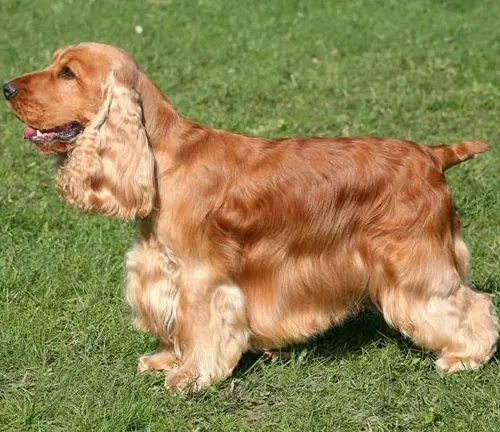
English Cocker Spaniel
- Size: English Cocker Spaniels are slightly larger and have a more athletic build compared to their American counterparts. They are considered medium to large-sized dogs.
- Coat: Their coat is dense, flat, and of medium length. It is designed to provide protection in various weather conditions. English Cocker Spaniels also come in various coat colors.
- Face: English Cocker Spaniels have a more angular and chiseled appearance in the face compared to the rounder face of the American variety. Their eyes are dark and expressive.
- Temperament: They are known for their lively, energetic, and intelligent nature. English Cocker Spaniels are often described as enthusiastic and active dogs that enjoy outdoor activities.
- Purpose: The English Cocker Spaniel has retained a closer connection to its hunting origins. They are still used as working dogs in some regions for tasks like flushing game birds.
- Recognition: The AKC also officially recognizes the English Cocker Spaniel as a distinct breed.
Frequently Asked Question (FAQs)
1. What is a Cocker Spaniel?
A Cocker Spaniel is a breed of dog known for its friendly and affectionate nature. There are two main varieties: American Cocker Spaniel and English Cocker Spaniel.
2. What is the difference between American and English Cocker Spaniels?
American Cocker Spaniels are smaller with a luxurious coat, while English Cocker Spaniels are slightly larger and have a more athletic build. They also differ in purpose and temperament.
3. Are Cocker Spaniels good family pets?
Yes, Cocker Spaniels are known for being excellent family pets. They are affectionate, friendly, and good with children.
4. Do Cocker Spaniels require a lot of grooming?
Yes, Cocker Spaniels have a high-maintenance coat that requires regular brushing and grooming to prevent matting and tangles.
5. Are Cocker Spaniels good with other pets?
Cocker Spaniels can get along well with other pets, including dogs and cats, especially if they are properly socialized from a young age.
6. Do Cocker Spaniels have health issues?
Yes, Cocker Spaniels are prone to certain health issues, including ear infections, eye problems, hip dysplasia, skin allergies, and more. Regular vet check-ups are essential.
7. How much exercise do Cocker Spaniels need?
Cocker Spaniels are active dogs that require at least 30-60 minutes of daily exercise. Mental stimulation through play and interactive toys is also important.
8. Are Cocker Spaniels good for first-time dog owners?
Yes, Cocker Spaniels can be suitable for first-time dog owners, but proper training and socialization are important for their well-being.
9. Do Cocker Spaniels bark a lot?
Cocker Spaniels can be prone to barking, especially if they are not properly trained or if they sense something unusual. Training can help manage excessive barking.
10. Are Cocker Spaniels easy to train?
Yes, Cocker Spaniels are intelligent and eager to please, making them responsive to training. Positive reinforcement techniques work well with them.
11. How long do Cocker Spaniels live?
The average lifespan of a Cocker Spaniel is around 10 to 14 years, but this can vary depending on their overall health and care.
12. Are Cocker Spaniels good watchdogs?
Cocker Spaniels are not known for being aggressive watchdogs, but they may bark to alert their owners to potential intruders.





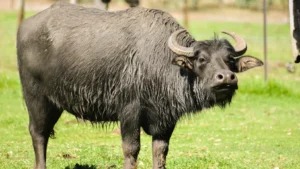
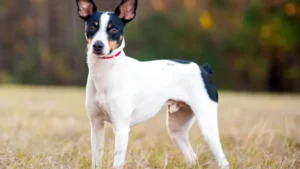
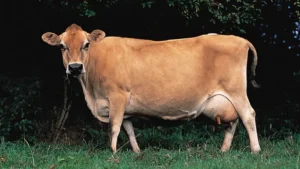
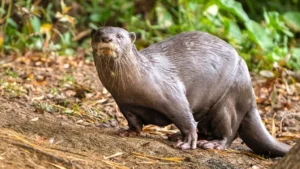





Leave your comment